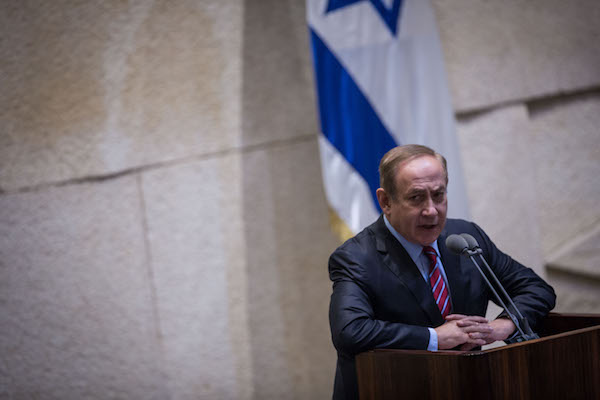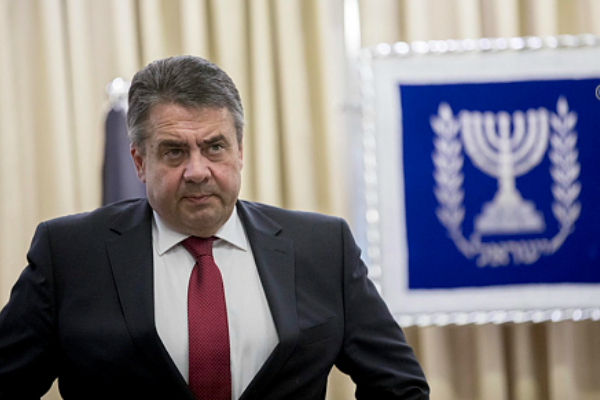Any blowback Netanyahu receives after snubbing the German foreign minister will be short-lived: his base is behind him, he has the patronage of the U.S., and the status quo will remain exactly as it is.

This week Netanyahu gave the world another lesson in how authoritarianism disguised as democracy works. Upon learning that the visiting German foreign minister, Sigmar Gabriel, refused to accede to his demand that he cancel his meetings with two NGOs that document human rights violations in territories controlled by Israel, the Israeli prime minister went ahead and canceled their own scheduled meeting as a punitive measure. Haaretz, Israel’s lone liberal newspaper, rightly disapproves. But the rest of the Israeli media is pretty much on board with Netanyahu.
The two NGOs are Breaking the Silence, which is composed of veteran Israeli combat soldiers who document abuses carried out by the army; and B’Tselem, which documents and raises awareness of human rights violations, while lobbying the Israeli government to implement international law in the territories.
Netanyahu and his ministers have for years targeted these organizations, portraying them as traitors and describing them to their base as effete Ashkenazi elitists who would rather curry favor with their European (read: anti-Israel) sponsors than be patriotic Israeli citizens.
The prime minister and Naftali Bennett, chairman of the ultra-nationalist Jewish Home Party and the current minister of education, have particularly focused on Breaking the Silence, repeating the claim that it slanders Israeli soldiers by labeling them war criminals. In a country with near-universal conscription for men aged 18-21, and a hard-wired national narrative rife with hero warriors, there is a well-primed and receptive audience for that message. The Israeli media repeats it frequently, along with the claim that most of the testimonies Breaking the Silence collects and curates are anonymous. This is not true, but these days hardly anyone bothers to carry out basic fact checks.
Sigmar Gabriel’s visit to Israel was scheduled so that he could participate in the ceremonies to mark Holocaust Memorial week. When Netanyahu said on Monday that he would not meet him if he also met with the NGOs, the German diplomat responded mildly that that would be “regrettable.”

Reuters reports that Gabriel expanded on German television, saying, “Imagine if the Israeli Prime Minister … came to Germany and wanted to meet people critical of the government and we said that is not possible … That would be unthinkable.” In other words, the diplomat handled the incident diplomatically — and intelligently. He refused to back down in the face of Netanyahu’s bullying tactics, but he was careful to use language that minimized the diplomatic damage.
This incident makes Netanyahu look bad in the eyes of international observers. He comes across as someone who has little respect for freedom of expression, and as a leader who fears criticism. But the key to understanding Netanyahu, who has been setting standards for 21st century authoritarian leaders since 2009, is that he doesn’t care what the world thinks of him. He cares what his base thinks of him — ‘though they’re mostly in the grips of a cult-like Bibi-worshipping trance these days.
For his base, hardwired nationalists for the most part, jingoistic language about “our soldiers” plays very well indeed. What Netanyahu is doing is discrediting any critics of his government by implying that they have nefarious, unpatriotic, ulterior motives. You’d be amazed at how effective these tactics are. Free speech is excellent, because Netanyahu can continue to assert that Israel is a democracy. Rather than stifling opposition, he discredits it, thus diluting its power to influence Israeli society.
Netanyahu has the United States’s patronage locked down tight for now, with his sponsor Sheldon Adelson pulling the strings in the White House, and the Tea Party with its syncretic right-wing Christian Evangelicals supporting the narrative of Israel’s national-Zionist/settlement movement. He looks a little uncouth right now, and he might be slightly embarrassed at the German government’s failure to escalate the incident — thus denying him further fodder in the form of “how dare those Germans criticize the Jewish state on Holocaust Memorial Day.”
But he’ll get over any residual shame pretty quickly. And if the publicity he provided for Breaking the Silence and B’Tselem results in their receiving increased donations from abroad, so much the better for Netanyahu. He’ll have more reasons to speak darkly about leftist traitors and foreign influences, while simultaneously boasting about Israel’s democratic culture and its lively critical discourse. He’ll stay in power and the status quo will remain exactly as it is.
Read more:
By nixing German FM meet, Netanyahu ups Israel’s tyranny a notch
Germany’s foreign minister calls Netanyahu’s bluff — and rightly so

